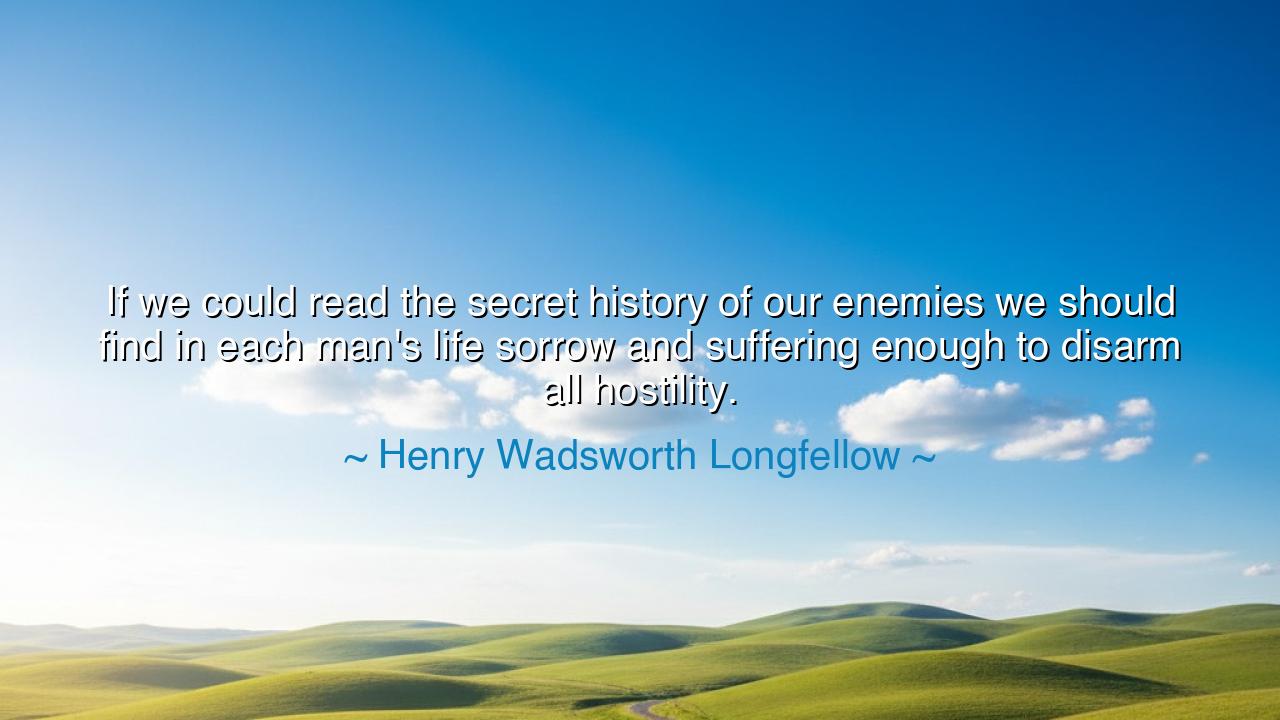
If we could read the secret history of our enemies we should find
If we could read the secret history of our enemies we should find in each man's life sorrow and suffering enough to disarm all hostility.






“If we could read the secret history of our enemies, we should find in each man’s life sorrow and suffering enough to disarm all hostility.” — Thus spoke Henry Wadsworth Longfellow, the poet whose words carried both gentleness and thunder, whose heart saw beyond conflict into the quiet truth of the human soul. In this sentence, he unveils one of the deepest insights ever given to humankind — that compassion is born from understanding, and that hatred is the child of ignorance. For if the heart could see not the mask of anger, but the pain behind it, it would tremble with pity instead of rage.
To say that we could “read the secret history of our enemies” is to imagine that we might glimpse the unseen burdens carried by those we despise. Every person who wounds has first been wounded; every cruel act grows from some unseen sorrow. Longfellow, writing in the shadow of the 19th century’s wars and divisions, understood that the roots of enmity lie not only in nations but in hearts. We judge others by their actions, but we know ourselves by our struggles. And if we could see their struggles as we see our own, we would no longer find enemies — only fellow sufferers in the long journey of life.
The poet’s words reach beyond politics or war; they pierce the very nature of human conflict. For enmity thrives in blindness. We see the anger in a man’s face but not the grief in his soul. We hear his harsh words but not the silence that haunts him in the dark. The ancients knew this truth well: the philosopher Socrates taught that no one does evil knowingly — that wrongdoing arises from ignorance and pain. Longfellow, centuries later, gave that idea the tenderness of a poet’s heart. Where Socrates reasoned, Longfellow felt, reminding us that behind every harshness lies a heart that has known sorrow.
Consider the story of Abraham Lincoln, who led his nation through civil war and was hated by many, even as he bore the weight of freedom’s burden. When victory was near, his generals urged vengeance upon the defeated South. But Lincoln refused. “Malice toward none,” he said, “charity for all.” For he, too, understood the secret history of his enemies — that they, too, had lost brothers, sons, and homes. He saw beyond hatred to humanity. And in that vision, he became not just a leader of men, but a healer of souls. Such is the power of Longfellow’s wisdom — to turn wrath into mercy, and vengeance into understanding.
If we could indeed see the hidden sorrows of those who wrong us — their loneliness, their fear, the disappointments that hollowed their hearts — how quickly our anger would soften. The mother who neglects may herself have grown unloved. The tyrant who oppresses may be haunted by insecurity and loss. The neighbor who envies may be crushed beneath his own sense of failure. Every heart is a battlefield we cannot see. To “read” this secret history is to awaken the higher vision — the ability to see not as the eyes see, but as compassion sees.
Longfellow’s words are not naïve. He does not ask us to excuse evil or to surrender justice. Rather, he calls us to temper justice with mercy, and to remember that hatred consumes the hater as much as the hated. Even wars, he implies, are fought not only by soldiers but by wounded nations seeking to avenge their pain. History itself is filled with the scars of misunderstanding, each generation passing its bitterness to the next. If humankind is ever to find peace, it must begin by reading — truly reading — the hidden pages of one another’s hearts.
Let this be your lesson, O listener: when you are wronged, pause before striking back. Ask not, “What has he done to me?” but, “What has life done to him?” Try, if only for a moment, to read the story behind his anger. In doing so, you will not only see him differently — you will be changed yourself. For compassion is the greatest weapon ever forged, and forgiveness the only victory that endures.
And so remember Longfellow’s eternal truth: every enemy hides a wounded soul, and every act of cruelty is a cry for healing. To know this is to see as the wise see, and to love as the divine loves. If we would only open our eyes to the secret histories around us, our swords would fall from our hands, and our hearts — once hardened by judgment — would beat again with the rhythm of mercy.






AAdministratorAdministrator
Welcome, honored guests. Please leave a comment, we will respond soon